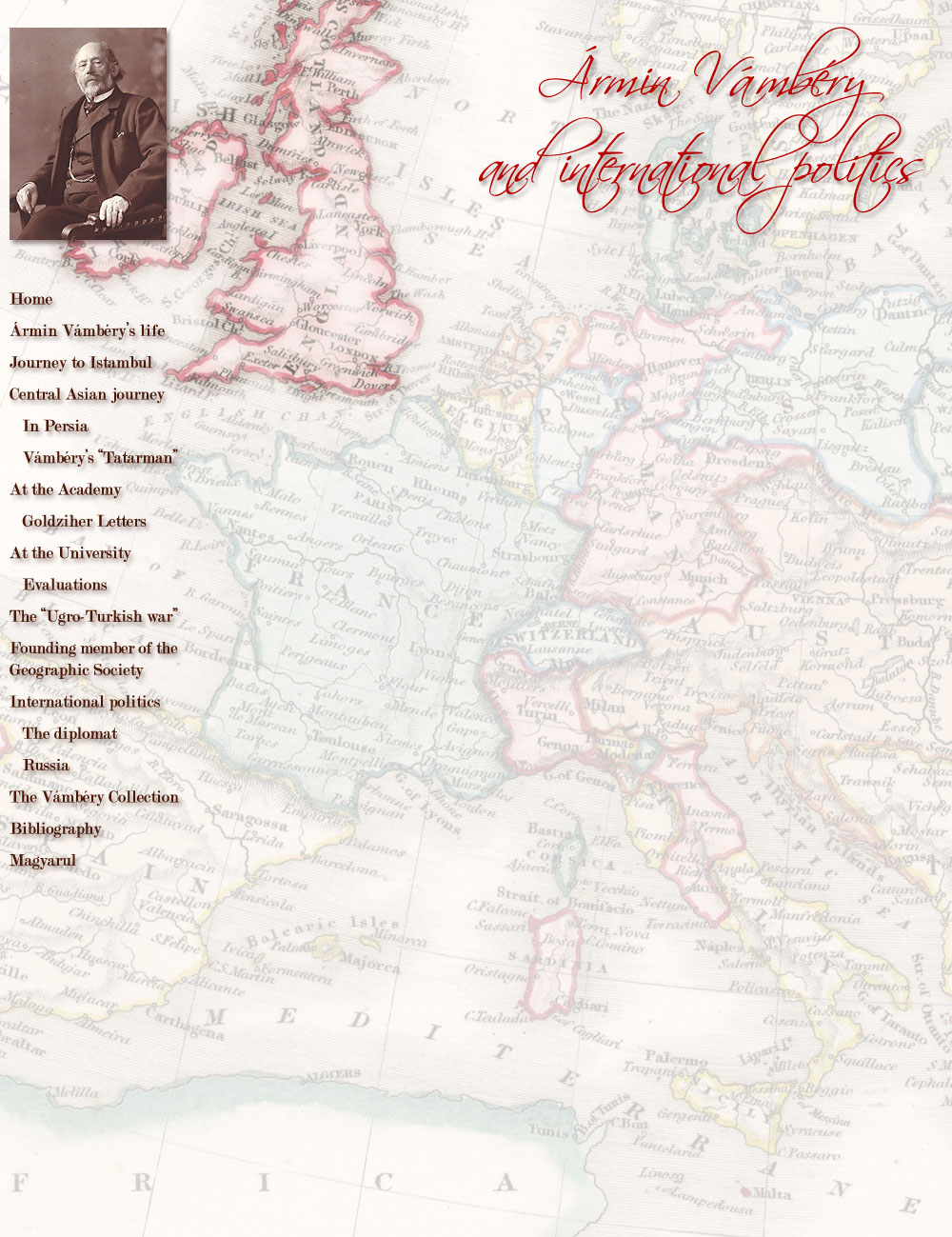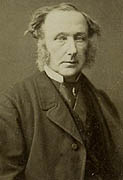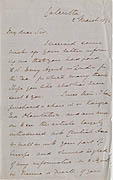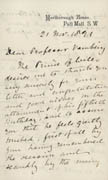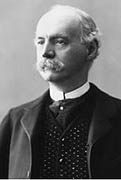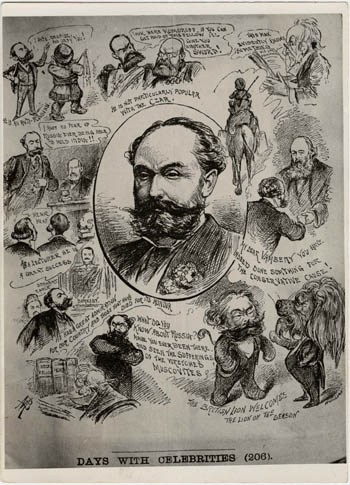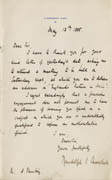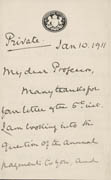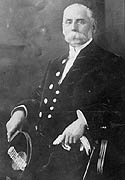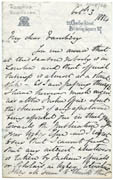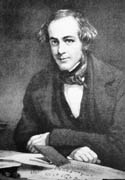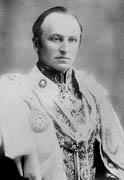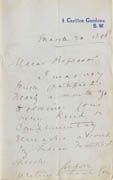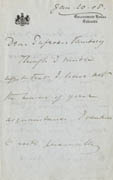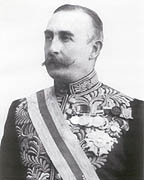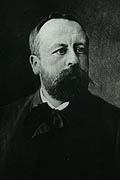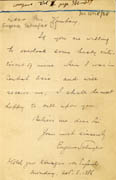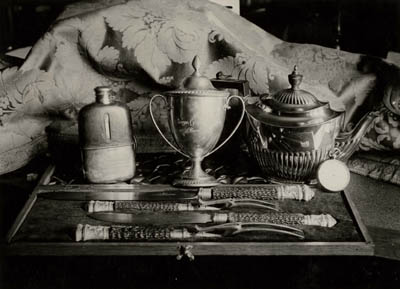 Ferenc Csirkés:
Ferenc Csirkés:
National science and international politics
in the work of Ármin
Vámbéry
(Originally published in the 2013/8 edition of Magyar Tudomány)
In the eyes of Hungarian public, Ármin Vámbéry is, next to
Sándor Kőrösi Csoma, perhaps the
best-known representative of Hungarian Oriental studies. The fascinating
travelogue of the lame dervish in disguise has been the favorite reading of
several generations, but many people also know the views he held on Hungarian
prehistory in the so-called “Ugro-Turkish war”, and which
finally proved wrong. This image of Vámbéry shows a sharp contrast to that of
the West, where he gained esteem as a political publicist and a renowned expert
of the Islamic world, who was on very intimate terms with certain British
political circles. Perhaps it is no exaggeration to say that Ármin Vámbéry was
the politically most active representative of Hungarian Oriental studies.
Interestingly, while we know increasingly more about his political activity,
this is usually treated separately from his scholarly oeuvre, although the two
fields are interconnected in several ways.
Both the scholarly and the political activity of Vámbéry focused on
the Islamic world, particularly on the Central Asian Turkic peoples, the Ottoman
Empire, and to a lesser extent to Iran. His oeuvre as a linguist, ethnographer
and historian was based on his knowledge and the linguistic material collected
here. A proper evaluation of his publicistic work is still to be done. However,
we can certainly state that he was an extremely fertile publicist, who
published, in addition to Hungarian, mainly in English and German, and to a
lesser extent in French.
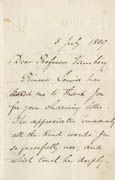 In certain periods of his life The London Times regularly published long
articles from his pen, but he also gave several interviews to other dailies and
magazines, wrote in international journals, and composed a number of works
analyzing the Islamic world from daily political point of view.
In certain periods of his life The London Times regularly published long
articles from his pen, but he also gave several interviews to other dailies and
magazines, wrote in international journals, and composed a number of works
analyzing the Islamic world from daily political point of view.
His international political activity was characterized by a pronounced British
orientation. After his famous Central Asian journey of 1863-64 it was the
British politics that most appreciated his experiences, field knowledge and
language skills, and laid claim to his services: he was honored by Queen
Victoria and was on intimate terms with King Edward VII. His articles and books
of political analysis were a great success on the British market, and he
occasionally also fulfilled tasks of confidential mediation, and sometimes of
intelligence service on behalf of the British foreign policy. During his career,
he made acquaintance with a number of Muslim politicians. He personally knew the
Persian Shahs Naser ad-Din (1848-1896) and Muzaffar ad-Din (1896-1907), and had
several decades of relationship with the Ottoman Sultan Abdulhamid II (1876–1909).
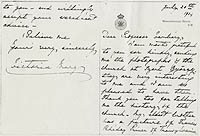 All this took place at the forefront of such global political processes, as the
increasing competition for colonies, the “new Eastern question”, that is, the
crisis of the Ottoman Empire, the rise of new ideas, especially the spread of
nationalism, which was a real threat both to multi-ethnic empires and the
European status quo.
All this took place at the forefront of such global political processes, as the
increasing competition for colonies, the “new Eastern question”, that is, the
crisis of the Ottoman Empire, the rise of new ideas, especially the spread of
nationalism, which was a real threat both to multi-ethnic empires and the
European status quo.
A curiosity of Vámbéry’s world famous Central Asian journey is, that probably he
was the last European to see the Khanates of Khiva and Kokand and the Emirate of
Bukhara before the Russian conquest, which redraw the map of the region. His
journey in dervish disguise was part of a long competition of diplomacies and
intelligence services, the so-called Great Game, also described in Kipling’s
Kim. The Great Game was a “cold war” between the Russian Empire, in
expansion to the East, and the British foreign policy, watching with jealous
eyes their Indian colonies, during which both parties sought to extend their
political influence on the large territory including Iran and Central Asia,
which separated the Indian British and Central Asian Russian colonies.
We do not exactly know whether Vámbéry had actual tasks of intelligence service received from the representatives of the British or any other great power, although in his work he did not conceal that during his travel through Central Asia and Western Afghanistan first he entered in contact with a British agent in Mashad, and in Tehran he reported on his experiences to the local British ambassador. Expecting a tremendous success after his return to Hungary, Vámbéry had to be disappointed, but in Britain his ambitions were compensated: after 1864 he became one of the most important media celebrities in Central Asian issues. This thread of his career probably reached its peak in 1885, during the conflict known as the Panjeh incident, when Vámbéry immediately published his opinion on the – in his opinion – impending military conflict. In fact, the Russian and British empires almost entered in war with each other, when the Russians occupied the village of Panjeh in the territory of modern Turkmenistan, and it was feared that Afghanistan might become under Russian influence. Although the conflict was finally resolved in a diplomatic way, and an English-Russian joint commission drew the borders of Afghanistan, Vámbéry remained one of the loudest advocates of the “Russofobe” trend in the British press, which was sure that the long-term plan of the Russians is the conquest of India, and which therefore required a more active and more aggressive British action against them.
Another activity of Vámbéry, perhaps less known in Hungary, is also
connected with the Russian-British relations. Its scene was the Ottoman Empire.
In 1888 the railway connection was opened between Budapest and Istanbul, making
it possible to Vámbéry to yearly visit the Ottoman capital for several weeks or
even longer times as the guest of Sultan Abdulhamid II (1876-1909). He regularly
reported on the meetings, the Ottoman political elite and other observations on
the Ottoman politics the British Foreign Affairs, who generously rewarded his
services. The importance of his personal meetings with the Sultan was due to the
fact that – in contrast to the earlier practice, when the Sultan ruled, but did
not govern, leaving this latter task to the Porta under the control of the Great
Vizier – Abdulhamid introduced an autocratic rule, and the center of power got
back to the Sultan’s palace. Abdulhamid was aware of Vámbéry’s British political
connections, and sometimes he also provided him with significant amounts, all
the more because he needed such well-known and respected publicists who were
able to repair his tattered reputation in the Western press. Thus the old
professor played the role of an informal mediator between London and
Constantinople.
The Turkish-British disagreements involved a number of areas. One of the main tasks of Vámbéry, at least in his own interpretation, was to weaken the Russian and strengthen the British influence in the Sultan’s court. For example, in 1889 he mediated the resentment of London for the Sultan’s having strengthened the artillery of the fortresses defending the Dardanelles, but not those along the Black Sea shores, since this could be interpreted a pro-Russian and anti-British gesture. In other cases he tried to persuade the Sultan to make concessions to certain non-Muslim ethnic minorities – in the specific case to the Armenians –, because the British feared the Armenians’ becoming subject to the Russian influence. London also feared the Sultan’s pan-Islamic aspirations, since Abdulhamid tried to exploit the fact that, as Caliph, he was the head of the Muslim world. Although since 1256, the end of the Abbasid dynasty the Muslim Caliphate was but a fiction, since the Treaty of Kuçuk Kaynardja in 1774 the Sultan was the protector of the Muslims living in Russian territories, and Abdulhamid wanted to also extend this role on the Muslim subjects of other states, thus on the huge Muslim population of India. Although the Ottoman state had no force to an active pan-Islamic foreign policy moving huge masses throughout the world, it could be well used for diplomatic pressure. Finally, the British tried to persuade Abdulhamid through the mediation of Vámbéry to a new convocation of the young Ottoman parliament.
One of the underlying causes of these conflicts was the radical
change which occurred in the British foreign policy. Earlier, the British sought
a balance of power in the continent, attributing both to the Austro-Hungarian
Monarchy and the Ottoman Empire an important role of counterweight against
Russia. At the time the Ottoman Empire was characterized by the contemporaries
and – let us point it out – the advocates of various forces eager about its
territory or at least for the economic and political control over it as
“Europe’s sick man”, although in this period Turkey was already ruled by the
second generation following the Ottoman reforms, the so-called Tanzimat Era (1839–1876).
However, the military, economic, legal, educational etc. modernization, as well
as the entry into global economy with inequal conditions had huge costs, which
the Ottoman state with its pre-modern system of revenues and weak industry was
unable to finance on the long term, and thus they had to resort to foreign
loans. They had increasing difficulty in paying back the loans and their
interests, which in 1875 led to a state bankruptcy. The economic control of the
empire largerly went over into the hands of an international committee, which
was a veritable state within the state, and their main task was to organize the
payment of the state debt, and to provide the means of production for this
purpose.
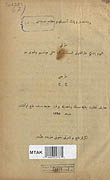 The so-called capitulation system was also an insurmountable problem and a deep
grievance to the Ottoman state. This meant that several Western great powers
enjoyed extraterritorial rights within the Ottoman Empire. Their subjects had
tax and tariff preferences, which gave them a huge advantage over the local
economic players. This economic problem also had a political tinge by the fact
that several non-Muslim ethnic minorities of the empire – mainly Greeks and
Armenians – received a so-called berat, that is, a document proving them
to be the subjects of a great power, and thus they also enjoyed the economic and
social advantages of their position. In addition, they were also entitled to
resort to the laws of the respective great power instead of those of the Ottoman
empire. Perhaps it is no exaggeration to say that since the late 19th century
until World War I, the Ottoman Empire existed in a semi-colonial context, and
the speed of the expansion of the great powers in its territory was restrained
not so much by the Ottoman resistance, as rather by the mutual rivalry of them.
In the late 19th century this expansion accelerated, because the increasing
industrial production demanded new markets, which the industrial powers had to
ensure both against the real or imagined threat of the colonial competitors, and
against the local middle class aspirations for independence. This is why the
British occupied Egypt in 1882, thereby also ensuring the undisturbed sea
connection with their Indian colonies through the control over the Suez Canal,
completed in 1869. The idea that the Ottoman Empire should ensure the Eastern
basin of the Mediterranean against the Russian aspirations increasingly faded on
the horizon of their foreign policy.
The so-called capitulation system was also an insurmountable problem and a deep
grievance to the Ottoman state. This meant that several Western great powers
enjoyed extraterritorial rights within the Ottoman Empire. Their subjects had
tax and tariff preferences, which gave them a huge advantage over the local
economic players. This economic problem also had a political tinge by the fact
that several non-Muslim ethnic minorities of the empire – mainly Greeks and
Armenians – received a so-called berat, that is, a document proving them
to be the subjects of a great power, and thus they also enjoyed the economic and
social advantages of their position. In addition, they were also entitled to
resort to the laws of the respective great power instead of those of the Ottoman
empire. Perhaps it is no exaggeration to say that since the late 19th century
until World War I, the Ottoman Empire existed in a semi-colonial context, and
the speed of the expansion of the great powers in its territory was restrained
not so much by the Ottoman resistance, as rather by the mutual rivalry of them.
In the late 19th century this expansion accelerated, because the increasing
industrial production demanded new markets, which the industrial powers had to
ensure both against the real or imagined threat of the colonial competitors, and
against the local middle class aspirations for independence. This is why the
British occupied Egypt in 1882, thereby also ensuring the undisturbed sea
connection with their Indian colonies through the control over the Suez Canal,
completed in 1869. The idea that the Ottoman Empire should ensure the Eastern
basin of the Mediterranean against the Russian aspirations increasingly faded on
the horizon of their foreign policy.
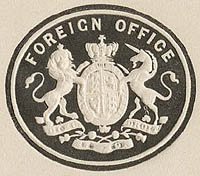 Between
1857 and 1862 Vámbéry spent five years in Constantinople. In these few years
immediately following the Crimean war he got acquainted with such key figures of
the Ottoman reforms, as Ali Pasha and Fuad Pasha. At the time, the British
support to the Ottomans was self-evident, just like later, when at the Congress
of Berlin of 1878 they could renegotiate the San Stefano Treaty, which closed
the Russo-Turkish War of 1877-78 ending with a serious Ottoman defeat, and which
supported to a large extent the interests of the Balkan states aspiring for
independency, and thereby the interests of the Russians supporting them. This
pro-Turkish policy started to change just by the mid- and late 188os, when
Vámbéry started his mediating activity. Abdulhamid’s reaction was to reverse
this process, and extort an open aid from the British. He tried to follow a
swing policy between the great powers, and to look for new allies – especially
for Germany as an emerging new superpower.
Between
1857 and 1862 Vámbéry spent five years in Constantinople. In these few years
immediately following the Crimean war he got acquainted with such key figures of
the Ottoman reforms, as Ali Pasha and Fuad Pasha. At the time, the British
support to the Ottomans was self-evident, just like later, when at the Congress
of Berlin of 1878 they could renegotiate the San Stefano Treaty, which closed
the Russo-Turkish War of 1877-78 ending with a serious Ottoman defeat, and which
supported to a large extent the interests of the Balkan states aspiring for
independency, and thereby the interests of the Russians supporting them. This
pro-Turkish policy started to change just by the mid- and late 188os, when
Vámbéry started his mediating activity. Abdulhamid’s reaction was to reverse
this process, and extort an open aid from the British. He tried to follow a
swing policy between the great powers, and to look for new allies – especially
for Germany as an emerging new superpower.
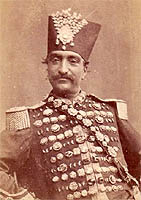 Another area, which was important to Vámbéry, and about which he had immediate
experiences during his renowned voyage, was Persia, ruled by the Qajar dynasty.
His interest was further fuelled by his interpreter’s role during the visit of
Shahs Naser ad-Din and Muzaffar ad-Din in Budapest. His relations with the
former reached back to his journey in 1863-64, when Naser ad-Din personally
received him. He remembered on the visits of the two Shahs on the pages of his
autobiographical My Struggles, and he also often shared his views on the
Iranian situation with the British Foreign Affairs. Here we should emphasize his
analyses written about the popular uprising against the tobacco monopoly
introduced in 1891. This decisive event in the history of Iran was initiated by
the fact that a British subject received the complete tobacco monopoly of Iran,
which included all activity connected with the cultivation and trade of tobacco,
thus it closely affected the largest sectors of society. Actively supported by
the Shia clergy, the revolt finally forced the court to retreat, and the Shah
withdrew the monopoly. Of course Vámbéry also interpreted this event as part of
the Anglo-Russian rivalry, although we must point it out that from the outset he
exactly recognized the hazardous nature of the events to the Shah’s court and
the British interests, in contrast to the British foreign policy, which first
lingered, and then proved helpless.
Another area, which was important to Vámbéry, and about which he had immediate
experiences during his renowned voyage, was Persia, ruled by the Qajar dynasty.
His interest was further fuelled by his interpreter’s role during the visit of
Shahs Naser ad-Din and Muzaffar ad-Din in Budapest. His relations with the
former reached back to his journey in 1863-64, when Naser ad-Din personally
received him. He remembered on the visits of the two Shahs on the pages of his
autobiographical My Struggles, and he also often shared his views on the
Iranian situation with the British Foreign Affairs. Here we should emphasize his
analyses written about the popular uprising against the tobacco monopoly
introduced in 1891. This decisive event in the history of Iran was initiated by
the fact that a British subject received the complete tobacco monopoly of Iran,
which included all activity connected with the cultivation and trade of tobacco,
thus it closely affected the largest sectors of society. Actively supported by
the Shia clergy, the revolt finally forced the court to retreat, and the Shah
withdrew the monopoly. Of course Vámbéry also interpreted this event as part of
the Anglo-Russian rivalry, although we must point it out that from the outset he
exactly recognized the hazardous nature of the events to the Shah’s court and
the British interests, in contrast to the British foreign policy, which first
lingered, and then proved helpless.
An interesting by-thread of Vámbéry’s colorful life was his connection with Zionism. He was personally acquainted with several Zionist leaders, including Tivadar Herzl (1860–1904) and David Wolffsohn (1856–1914). He tried to mediate between the Zionists and Sultan Abdulhamid, when the former suggested, that in exchange for a Palestinian mandate they buy up the considerable Ottoman state debt, also suggesting that the Jewish immigrants would be loyal and grateful Ottoman subjects with an European culture who would provide assistance in the modernization of the Ottoman state. Vámbéry managed to achieve that in May 1901 the Sultan received the Zionist delegation, but the talks later stalled.
But why was Vámbéry such a militant representative of the British
interests? His own financial and career interests obviously played a role in
this. As already mentioned, the British Foreign Affairs provided him with
generous honoraria, and in the last years of his life he even managed to ensure
a regular pension from them. However, his British orientation also have deeper
reasons, connected with the status of the secularized Jewish intellectuals in
Hungary in the dualist period (1867-1918). To understand this, it is worth to
read a long report of Vámbéry to the British Prime Minister and Minister of
Foreign Affairs Salisbury, closed with the following sentences: “These were my
views on the present and future situation of Turkey. You, Sir, and several other
members of the British government may reproach me for the fact that the tone of
my public writings and of my secret report differ so much from each other, and
perhaps I merit the criticism for so vigorously defending a country and a
society, whose future I am forced to paint with just a faint ray of hope. I can
be criticized, because I work for the maintenance of a rotten situation against
a perhaps better government. But I was born Hungarian, and my soul is British,
and therefore I have to keep in mind our common interest and no humanitarian
principles, which might sound beautiful from the pulpit, but have no place in
politics. As a Hungarian, I have to repel the mortal blow, with which Russia
threatens my homeland through their continuous intervention in the Balkan
Peninsula, and as an European proud of his freedom and culture, I have to defend
Britain, the glorious champion of freedom and civilization, whose position will
be seriously undermined if Russia ever reaches Constantinople and Asia Minor.
This goal unites us, you, the Brit and me, the friend of Britain.”
Vámbéry, as well as the Hungarian foreign policy in the dualist period saw in Russia the main threat on the existence of Hungary. The Russian support to the nationalist movements of the Balkans and to the Slavic peoples of the Austro-Hungarian Monarchy threatened the existence of the historical Hungary, in which the Hungarians were in the minority. The Ottoman and Hungarian interests were common in this area, since the nationalist movements threatened the status quo both of the multi-ethnic Ottoman Empire and of the Austro-Hungarian Monarchy. The nightmare of the Russian intervention was a common experience of the political elite of the Compromise (1867) from 1849, when the Hapsburgs suppressed the Hungarian aspirations for independence with Russian support. Vámbéry commemorates this in his autobiographical My Struggles: “My student years in Pozsony are closed by one image from 1849. Some fifteen thousand Russians marched through the city. They crossed the bridge from the left side. They wore pointy hats, their cinnamon-colored frieze cloaks were folded in two above the knee to make it easier to walk. I remember, because it struck me, that not only the crew, but the officers also wore a kit on their backs. We boys – we all were Hungarian children from Csallóköz – watched them from the roadside, and our soul was filled with bitterness. I think it was in that hour that my heart was imbued with that unquenchable hatred, which has made me one of the most militant anti-Russian writers in the English journalism for these forty long years.”
The Compromise of 1867 was also possible because the Hungarian
political elite realized, that the multi-ethnic historical Hungary with a
Hungarian supremacy can be preserved only within a larger political unit. The
Austro-Hungarian Monarchy offered the framework to this. This is why Vámbéry
could argue for the British-Hungarian common interests, and refer to the
parliamentary traditions considered similar in the Hungarian and British public
opinion. We know from his autobiography, that Vámbéry was an advocate of the
liberal traditions of the Enlightenment, as well as of the Hungarian liberalism,
and in this system Russia appeared as a demon of the threatening Asian
despotism. In terms of a Realpolitik it seemed thus more useful to
support the Ottoman Empire – which, in views of Vámbéry, was just as backward
and despotic – against Russia, although Vámbéry also recognized and judged
worthy of support the reform efforts of the former. The background of the
Russophobie and Turkish friendship of Vámbéry, the secularized liberal Jewish
intellectual, is thus provided by the national liberal context of the Dual
Monarchy.
Here we must shortly mention Vámbéry’s Jewish origin, which played an important
role in shaping his political views. In 1867, the Hungarian parliament adopted
the law on Jewish emancipation. This law provided the legal framework for a
model of development, which was unparalleled in Europe. One of the secrets of
the dynamic development of Hungary in the age of dualism was certainly the tacit
agreement, under which the administration remained in the hands of the Hungarian
nobility, but the positions of economic life and the intellectual careers were
open to the Jews, who occupied these in a much larger number than their
proportion in the population. Thus the majority of Hungarian Jews
enthusiastically embraced the ideas of Hungarian national liberalism. Vámbéry’s
life is a prominent example of the successful Jewish intellectual career of the
period.
And perhaps this is also the point linking his scholarly and political activity. Vámbéry can be considered one of the founders of Turcology. He did this in an age, when the still partly existing institutional framework of Hungarian scholarship was formed, and he became the professor of the Department of Eastern Languages, founde by him at the University of Pest. At the same time, in 1877 was also established the National Rabbi Seminary, with the professorship of such excellent Oriental scholars, as Ignác Golziher Ignác (1850–1921) or Vilmos Bacher (1850–1913). The recognition of Vámbéry in Hungary as a scholar of Jewish origin, the key of his successes and his social emancipation was based on the cultivation of Turcology as part of the Hungarian national scholarship. Its most important direction was the research of the Eastern roots of Hungarians, but Vámbéry also cultivated several other branches of this area. He studied the cultural anthropology of Turks, and his philological achievements are also extremely important, since he published or presented for the first time a number of early texts which are essential in the history of Turks, like the Kutadgu bilig or Sheibaniname, and he gave the first systematic description of Chagatai Turkish, the literary language of the Eastern Turks used between the 14th and 19th century. Perhaps it is no exaggeration to say that the Eastern Turkic philological research and the cultural anthropological and ethnographical description of the Turks in Vámbéry’s A török faj ethnológiai és ethnográfiai tekintetben (The Turkic race in ethnological and ethnographical aspects) received a certain actuality with the Russian expansion in Central Asia, since most of the Turkic peoples studied by him were Russian subject at that time, and the Chagatai Turkic language was the literary language of an area which by then stood under Russian control. This research direction, the study of the Turks living in the Russian Empire was also acknowledged by his invitation in 1913, the last year of his life, to the editorial of the journal Turan, whose objectives also included the relationship building and search for a kind of alliance with the Eastern cultural relatives of the Hungarians.
 Here
we have to mention his relationship to religion, most notably to Islam. Vámbéry
was not only a Turcologist, but also an Orientalist in the classical sense of
the word. He studied an East, which was defined by the rationalist, secularized
European intellectual as the opposite of the modernization founded on the
principles of the Enlightenment. This applies to religion as well. Vámbéry had
no doubt that Islam as a religion produced values throughout its history, but
the solution for “the East” can be only the assimilation to the European
civilization. Religion in general, but especially Islam is the carrier of
backwardness and superstition. Turcology itself as a “pan-Turkic” system of
views was also a response to this situation. Similarly to the other
“pan-movements”, it offered an ethnic, racial, linguistic community instead of
the pre-modern religious identities, and in this sense it was the scholarly
appearance of a new paradigm of modernization. This is also easy to understand
in the case of Vámbéry, the emancipated Jew, whose religiously defined original
community lived, until the emancipation, at the periphery of every European
society, occasionally exposed to persecutions. The modern national state,
however, offered new frameworks for them, or at least their hope, where
religious identity will not count any more.
Here
we have to mention his relationship to religion, most notably to Islam. Vámbéry
was not only a Turcologist, but also an Orientalist in the classical sense of
the word. He studied an East, which was defined by the rationalist, secularized
European intellectual as the opposite of the modernization founded on the
principles of the Enlightenment. This applies to religion as well. Vámbéry had
no doubt that Islam as a religion produced values throughout its history, but
the solution for “the East” can be only the assimilation to the European
civilization. Religion in general, but especially Islam is the carrier of
backwardness and superstition. Turcology itself as a “pan-Turkic” system of
views was also a response to this situation. Similarly to the other
“pan-movements”, it offered an ethnic, racial, linguistic community instead of
the pre-modern religious identities, and in this sense it was the scholarly
appearance of a new paradigm of modernization. This is also easy to understand
in the case of Vámbéry, the emancipated Jew, whose religiously defined original
community lived, until the emancipation, at the periphery of every European
society, occasionally exposed to persecutions. The modern national state,
however, offered new frameworks for them, or at least their hope, where
religious identity will not count any more.
Ármin Vámbéry’s political and scholarly activity are two faces of the same
portrait of the Jewish elite intellectual of the age of dualism. With his
British orientation and Russophobie he defended the Hungarian national
progression, just as his Turcologist activity had connection with this effort of
foreign policy. His scholarly work also provided the national liberalism with
spiritual food in the sign of Jewish emancipation. He exactly saw that the
collapse of the large, multi-ethnic empires – especially of the Austro-Hungarian
Monarchy and the Ottoman Empire – will mean the end of this world.
References:
Alder, Lory – Dalby, Richard (1979): The Dervish of Windsor Castle: The life
of Arminius Vambery. Bachman and Turner, London
Csirkés, Ferenc (2002): Defender of Three Empires: Ármin Vámbéry and the Eastern
Question. In: Ittzés Gábor – Kiséry András (szerk.): Míves semmiségek. Elaborate
Trifles. Tanulmányok Ruttkay Kálmán 80. születésnapjára. Studies for Kálmán G.
Ruttkay on his 80th Birthday. (Pázmány Papers in English and American Studies
2). Pázmány Péter Katolikus Egyetem, Piliscsaba, 454–475.
Diószegi, István (2001): Az Osztrák–Magyar Monarchia külpolitikája, 1867–1918.
[Foreign policy of the Austro-Hungarian Monarchy]
Vince, Budapest
Dobrovits, Mihály (1999): Vámbéryval 2000-ben. [With Vámbéry in 2000] 2000. 11, 3, 49–61.
Hopkirk, Peter (1994): The Great Game: The Struggle for Empire in Central Asia.
Kodansha International, New York–Tokyo
Jeszenszky, Géza (1986): Az elveszett presztízs: Magyarország megítélésének
megváltozása Nagy-Britanniában (1849–1918). [The lost prestige:
Changes in the perception of Hungary in Great Britain, 1849-1918] Magvető, Budapest
Karády, Viktor (2000): Zsidóság Európában a modern korban: társadalomtörténeti
vázlat. [Jews in Europe in the modern age: socio-historical outline] Új Mandátum, Bp.
Réthelyi, Mária (2009): German Jews as Hungarian Nationalists and the Emergence
of Oriental Studies (unpublished doctoral dissertation). The University of Chicago,
Chicago
